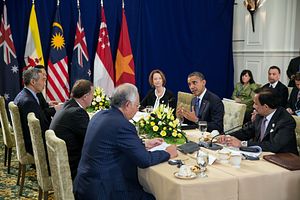Last month saw the culmination of an extraordinary policy convergence between America’s two major political parties. Almost as if the nominees were making the same speech before their respective conventions, both Hillary Clinton and Donald Trump pledged to protect Americans from “unfair trade deals,” which any astute observer would recognize as a reference in part to the Trans-Pacific Partnership (TPP), a yet-to-be-ratified free-trade agreement between the United States and eleven Pacific Rim countries. Throughout their campaigns, Clinton of the Democratic Party and Republican candidate Trump have demonized the TPP as a grim reaper for the working class, pledging to repudiate the pact once in office.
However, for all their rhetoric about protecting jobs and industry, what Trump and Clinton fail to understand is that the only guaranteed benefactor of their opposition to the agreement is not the downtrodden workers whose votes they seek, but one of the few entities that they both villainize even more than the Trans-Pacific Partnership: the People’s Republic of China.
The nominees’ claims that rejection of the pact would protect American workers from an inflow of detrimental imports or an outflow of good-paying jobs are, at best, immensely speculative. There are a multitude of credible studies that seriously challenge such accusations, ranging from an American Farm Bureau report that annual agricultural exports will increase by $5.3 billion to an East-West Center study that estimates a doubling of U.S. services exports under the TPP. Such data provides ample support to at least conclude that the nightmarish predictions from Clinton and Trump about the TPP are by no means guaranteed, and that there is a chance that a failure to adopt the TPP could hurt the middle and working classes.
In contrast, it is an undeniable certitude that a repudiation of the TPP would benefit Beijing. After all, there is a reason why Chinese leaders express concern about the agreement, and why President Xi Jinping even went so far as to broach the issue with President Barack Obama in 2013 – the TPP would allow Washington to define the rules of the Pacific economy, would strengthen political, economic, and military relationships between the U.S. and the region, and most significantly, would leave China out.
However, without the TPP, it is the U.S. that could be left out. Instead of looking west, to America’s farms and factories, Pacific nations seeking foreign trade and investment will look east, to Beijing. And, as the only game in town, China will be able to set the rules.
Signs of this are already evident in the negotiations over the Regional Comprehensive Economic Partnership (RCEP), a free trade agreement comparable to the TPP, but led by Beijing. The RCEP would not only provide Chinese businesses with to opportunities similar to those available to Americans under the TPP, but would allow Beijing to upset economic orthodoxy and reshape the region as it sees fit, into an area where unfair competition by state-controlled business continues, a free and open internet is a fantasy, intellectual property is disrespected, and environmental and labor standards are no different from those on the Chinese mainland. It would also open the door for China to continue its pattern of assertiveness in the South China Sea, as an increased dependency of regional powers like Vietnam, Malaysia, and the Philippines on Chinese investment would make those nations more likely to accept any strings Beijing might add. Without an American-led TPP, opportunity abounds for China, and the Pacific nations who crave development and investment will have little choice but to accede.
Yet, Clinton and Trump continue to passionately oppose the Trans-Pacific Partnership, a position which guarantees a rough awakening next January. As Singapore’s Prime Minister Lee Hsien Loong aptly stated during a visit to Washington earlier this month, “[I]f, at the end, waiting at the altar, the bride doesn’t arrive, I think there are people who are going to be very hurt.” Those people, Washington’s key allies and nations pivotal to America’s role in the Pacific, signed up to trade with the U.S. and spent years negotiating the right to do so. They need what the TPP could provide. But, at the end of the day, they have another suitor eagerly waiting in the wings.
Steven Keithley is a third-year law student at the University of Virginia School of Law, where he serves as Executive Editor of the Virginia Journal of International Law and an editor of Virginia Law Review.

































